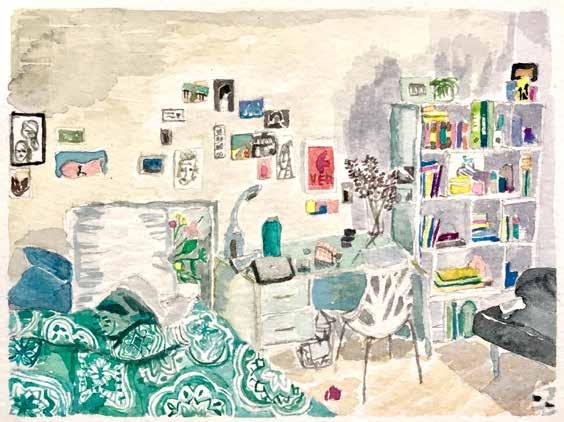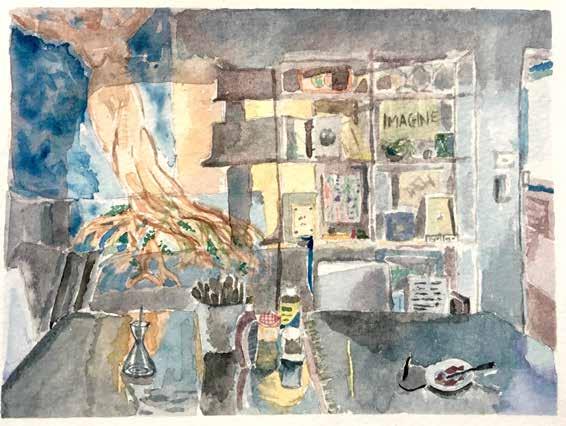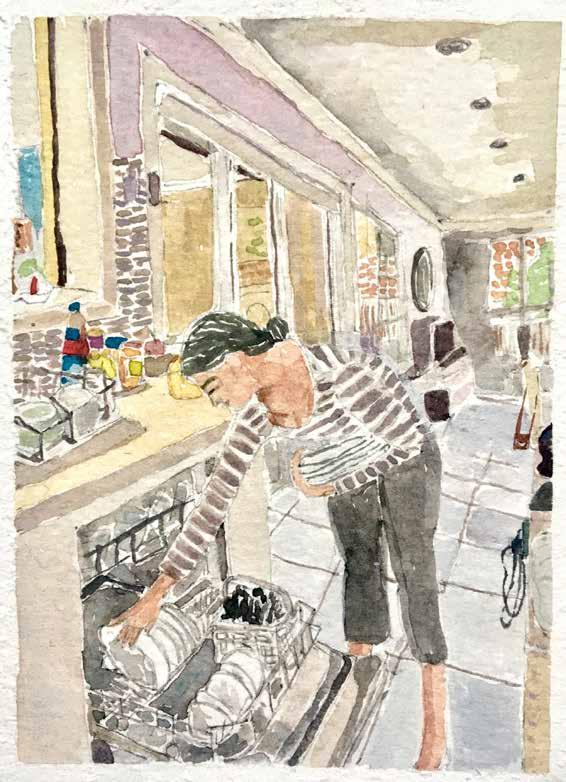
9 minute read
Perspective
Spaces in isolation

Advertisement

Whilst reflecting on lockdown I kept thinking about the absurdity of it all. The necessary separation from our friends and our external lives. The anxiety of leaving the house.
For many of us, we had probably never spent as much time inside as we did in the months from March to July.
I wanted to capture the unique spaces we were confined to, so I asked five women to send me photos of a part of their house which was significant to them during lockdown, and to share the story of that significance with me.
All five women reflected on their privilege and recognised that many people have, and will continue to face hardship as a result of COVID-19. Lockdown was a pluralistic experience and the perspectives that are shared here represent singular perspectives.
During quarantine Olivia Niethe returned to her family home, a small beach village six hours north of Sydney. The picture shows a beautiful collection of all the things which became important to her during this time. Propped up on the left is a surfboard which she hadn’t touched for two years. She described the nostalgia that getting back into this hobby bought her and added that “the ocean, swimming and surfing became a huge part of getting through isolation”. To the right of the board is a crocheted rug which her Mum has made for each child as they left home. On top of the rug is a stack of novels (one being The Secret History which she highly recommends) and some piano books. Olivia noted her initial frustration of not being able to play the piano as well as she used to. However, this feeling was overcome by the joy she found in playing when she removed expectation.
For Olivia the move home brought with it conflicting thoughts and feelings. It was a space so closely tied to her younger self and identity, so coming back felt like she was “going backwards”, reentering a time of her life that she’d moved so far from. But after reflecting, she realised that the space gave her the opportunity to be with her own thoughts, desires and emotions. She described how over the past two years she hadn’t stopped, constantly keeping up with social expectations, university and work. Looking back on her time spent at home in lockdown Olivia said, “I feel so grateful for what that space allowed me to be, allowed me to think and foster and do. I didn’t think I needed that space and I definitely came to appreciate it from a different perspective”.
Phoebe Wolfe noted that 2020 was a start to the new decade, a time to turn a new leaf, but “the absolute irony is that we’ve all been forced to feel this stagnation”. Change is often marked by events external to us, but Phoebe commented on how lockdown forced us to acknowledge the internal changes. She also explained how, for her, staying in the same space meant “staying in old habits and old identities”. So, at the start of lockdown she decided to change her room around, painting her walls and rearranging the space. She said, “It felt like it was a different space even though it was the same room I’ve grown up in for 10 years.”
I asked Phoebe how she feels about her room presently. She replied, “I’ve felt the urge to change it again. When I walk in it feels like I’m back in isolation”. For Phoebe there seems to be a strong association between the layout of a space and its connection to a particular time. She described how “we’re still in limbo, we could go back into isolation at any moment”. This made me reflect on how the future feels suspended between two outcomes: the first being the gradual return to life outside of lockdown, and the second, the lingering thought that COVID-19 cases will rise and we’ll have to return to isolation.
I noticed a pair of pointe shoes hanging on the pink room divider in her room. When I asked Phoebe about them she explained that she’d watched a YouTube video of Alexa Chung going to a ballet class in New York. Feeling inspired she looked up the ballet teacher from the video and found that she was running online classes. There was a discounted pandemic price, so she logged on and rekindled her old passion for ballet.
Anthia Balis also felt the need to change her space around during lockdown. She told me that she hadn’t changed the layout of her room in years and said ‘the first time I changed it around I couldn’t help but feel anxious. I think it’s a thing about change. But then I eased into it. And now I’m just enjoying the space”. We talked about the interplay between a person and their space. Even small things that seem trivial, like the position of the bed in the room, can affect the way we feel. Anthia said that her room was a “reflection of my mental and emotional state. If I’m feeling aligned my room will be neat”.
In July, Anthia curated an exhibition for Verge Gallery called pause.play. As part of it she interviewed people on their experiences in lockdown. To me, she described how it made her realise that “life is weird because we don’t get to ask everyone deep questions. But the beauty of the interviews were that they enabled me to get to the deep stage quite quickly”. She goes on to describe how “it was so lovely to hear how other people were doing. It was such a comfort being able to relate to them”.
Kavya Nagpal said she became more conscious of the small moments in her day. Little sensory experiences started to mean so much. The feeling of morning grass on bare feet, the spotted shade underneath the washing line and the afternoon sun soaking her room in light. For Kavya, quarantine allowed her to take a break from the constant rush of life. The minutes and hours saved from what would’ve been time spent commuting allowed her to exist in her space in a way she hadn’t before. She described how “the house became the literal perimeter of what I was allowed to occupy space in, so I started exploring it a bit more”. She went on to describe how “slowing down reinstated a balance and allowed me to take account of things that matter”. She said, “now I have time to enjoy a morning sipping chai in the sunshine or chatting to Nani” (her Grandmother).
We talked about how our world provides an overload of stimuli: chatter on the train, the frenetic feeling of a jostling city crowd, short and awkward hellos to acquaintances we bump into, the abruptness of advertisements on the street. But in isolation the chaos of life was simultaneously peeled back in our physical worlds, though perhaps increased in the invisible online one as we constantly read updates on the status of the global pandemic.
Kavya described how there are so many subliminal messages that we are affected by. She mentioned how “the world delivers you some existential angst… There’s a lot of beautiful things but there are also a lot of experiences that I feel are very subliminal”. Often, we don’t have control over what tacit experiences we’re exposed to. We may be left with an emotional response of which the cause seems unclear.
Violet Hull sent in a photo of her family’s living space. At the time of taking this photo the afternoon sun was pouring in through the window, trickling through the plexiglass shelf and casting interesting shadows over the space. To the right of the shelf is a fresco that Violet’s Mum created. The bottom of the piece is laced with smashed glass from a car that her Mum had collected on a street in New York. In the foreground of the picture are two silver metal café tables which operate as their dinner tables. The tables can also be moved into a big square, two separate squares, one long table or an L shape. Violet said “they are the most versatile tables ever”.
During lockdown Violet decided to bring her mattress into the living room. She told me; “When you can’t rebel out in the wide world I guess the only thing you can do is say fuck you to living expectations and put your mattress on the carpet in front of the TV”. She also described how there was a different morning light in the room which was refreshing. “It took a long time for my parents to kick me out,” she laughed.

Watercolours and words by Isla Mowbray

Violet commented on how her surroundings became a familiar blur. However, she mentioned that “there were still moments where I noticed things that I’ve never noticed before”. She was referring to an artwork on her shelf, a word piece, which she’d only just come to read.
For the wonderful people I interviewed, it seemed lockdown was a time of uncovering things. It may have been an activity from their past, like ballet and surfing, or discovering something that was always in plain sight but perhaps they hadn’t had the time to observe or experience before.
For me, the white square box of my bedroom allowed me to exist in an expansive aloneness. Contrary to feeling confined I felt a peculiar freedom in the way that my thoughts and feelings were able to unravel at their own pace. This time gave me a greater capacity to reflect, an act which had become increasingly rare in my life as I felt a persistent push driving me into the future while I unintentionally abandoned moments from my past.
For some of us, the enforced quietness that trickled into our minds and rooms sparked a desire to change and shift the spaces that we had control over. Maybe this rearranging was an attempt to mirror the perpetual chain of new experiences that we face in our lives outside of lockdown, trying to recreate a sense of change that we are so used to experiencing.
In lockdown we excavated memories and moments from our past. It may have been a forgotten pastime or perhaps it was an uncovering of something that was always in plain sight but there hadn’t been the time to observe or experience it before.
We all responded to this time spent in lockdown in unique ways, however these interviews revealed the many similarities of this isolated collective experience.








